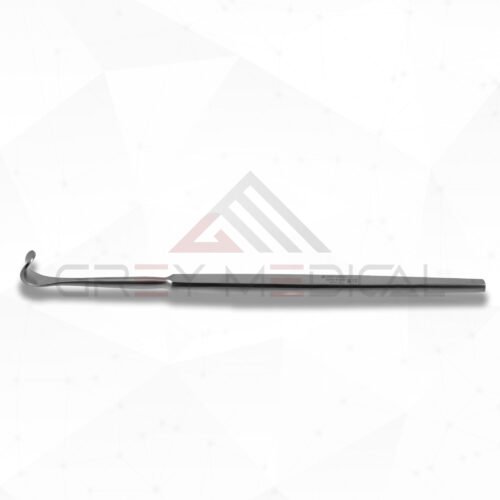The Indispensable Role of Surgical Spoons in Modern Medicine
In the vast and intricate world of surgical instruments, some tools are defined by their simplicity and effectiveness. The surgical spoon, though it may sound basic, is one such instrument that plays a crucial and often understated role in a wide range of medical procedures. Far from a simple utensil, this specialized surgical spoon instrument is designed with meticulous precision to perform specific functions that are vital for patient safety and successful outcomes. GreyMedical®, a company dedicated to innovation and excellence in the craft of surgical instruments, recognizes the importance of every tool in a surgeon's kit, including the versatile and reliable surgical spoon.

The Design and Functionality of a Surgical Spoon
A surgical spoon is typically a small, cup-shaped instrument with a long handle, crafted from high-quality surgical-grade stainless steel. Its design is deceptively simple, yet it is engineered for specific surgical tasks. The concave head, or bowl, is used for scraping, scooping, and removing tissues, debris, or foreign bodies from a surgical site. The edges of the spoon are often designed to be smooth or slightly serrated, depending on its intended use, ensuring that it can effectively remove material without causing unnecessary damage to surrounding healthy tissue. The long, ergonomic handle provides the surgeon with a secure grip and excellent control, allowing for precise manipulation in deep or confined surgical fields.
Versatility Across Various Surgical Specialties
The versatility of the surgical spoon makes it a staple in numerous surgical disciplines. In orthopedic surgery, it is frequently used to scrape out bone fragments or to clean out an abscessed cavity, ensuring that no infected material remains. In general surgery, it may be employed to remove gallstones from the gallbladder or to clear out cysts and tumors. Ear, Nose, and Throat (ENT) surgeons find them essential for procedures within the nasal cavity or ear, where they are used to gently remove polyps or debris. Furthermore, in neurosurgery, specialized spoons are used to meticulously remove small tumors or cysts from delicate brain tissue. The adaptability of this instrument highlights its critical function in ensuring a clean and precise surgical site, which is fundamental to preventing infection and promoting healing.
GreyMedical®’s Commitment to Craftsmanship and Innovation
At GreyMedical®, the creation of a surgical spoon is treated with the same level of care and precision as any complex surgical device. The company's commitment to excellence ensures that each instrument is made from the finest materials, guaranteeing durability, sterility, and resistance to corrosion. Through a rigorous manufacturing and quality control process, GreyMedical® ensures that every surgical spoon meets the highest standards of safety and performance. The company’s dedication to working closely with medical professionals allows for continuous improvement, leading to instruments that are not only effective but also ergonomically sound, reducing surgeon fatigue and enhancing procedural accuracy.
Conclusion
The surgical spoon, though a seemingly simple instrument, is a cornerstone of modern surgical practice. Its design and functionality are perfectly suited for the crucial tasks of scraping, scooping, and clearing surgical sites, which are essential for preventing complications and ensuring positive patient outcomes. From orthopedics to neurosurgery, its versatility makes it an indispensable tool for a wide range of procedures. GreyMedical®’s commitment to quality and craftsmanship ensures that surgeons are equipped with reliable and effective instruments. The surgical spoon, when crafted with the precision and care that GreyMedical® provides, is more than just a tool; it is a vital part of a surgeon's ability to provide the best possible care. Its unassuming form belies its critical role in maintaining the highest standards of cleanliness and precision in the operating room.
What's Your Reaction?
 Like
0
Like
0
 Dislike
0
Dislike
0
 Love
0
Love
0
 Funny
0
Funny
0
 Angry
0
Angry
0
 Sad
0
Sad
0
 Wow
0
Wow
0














































